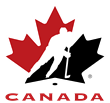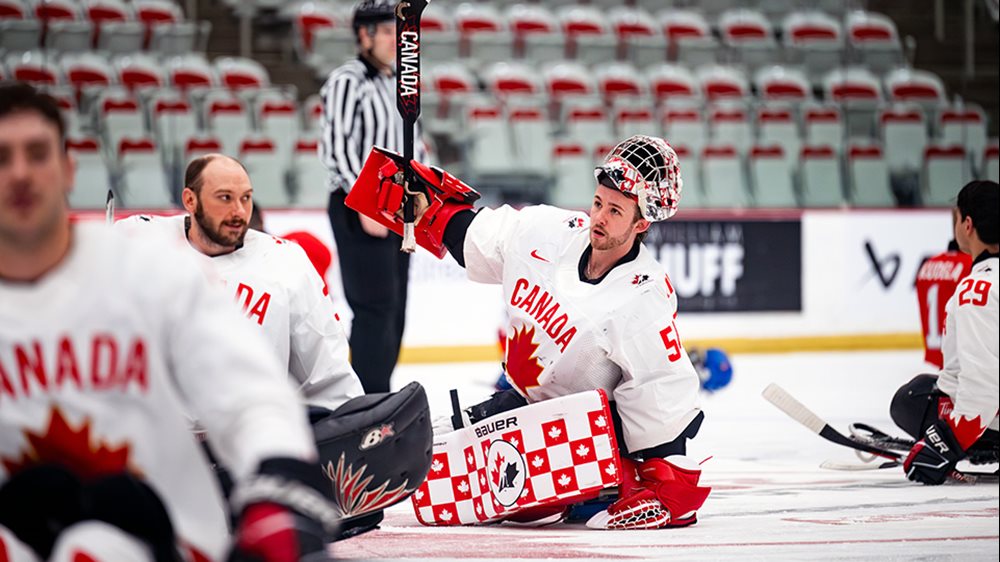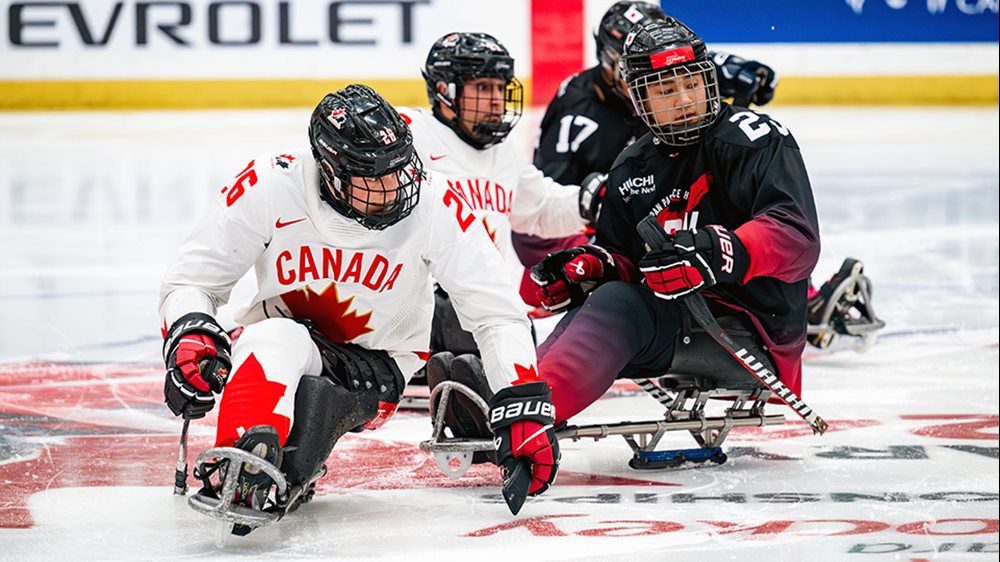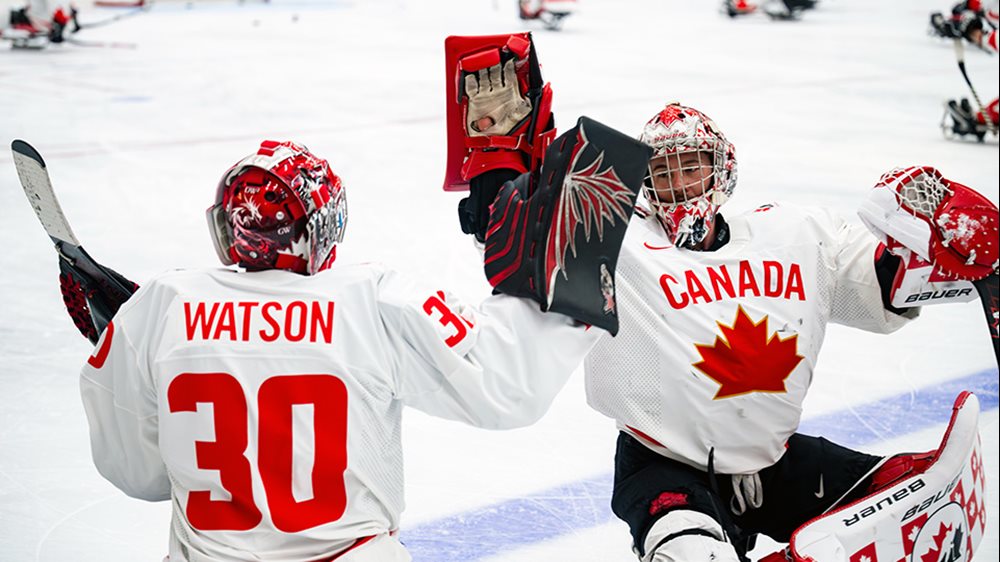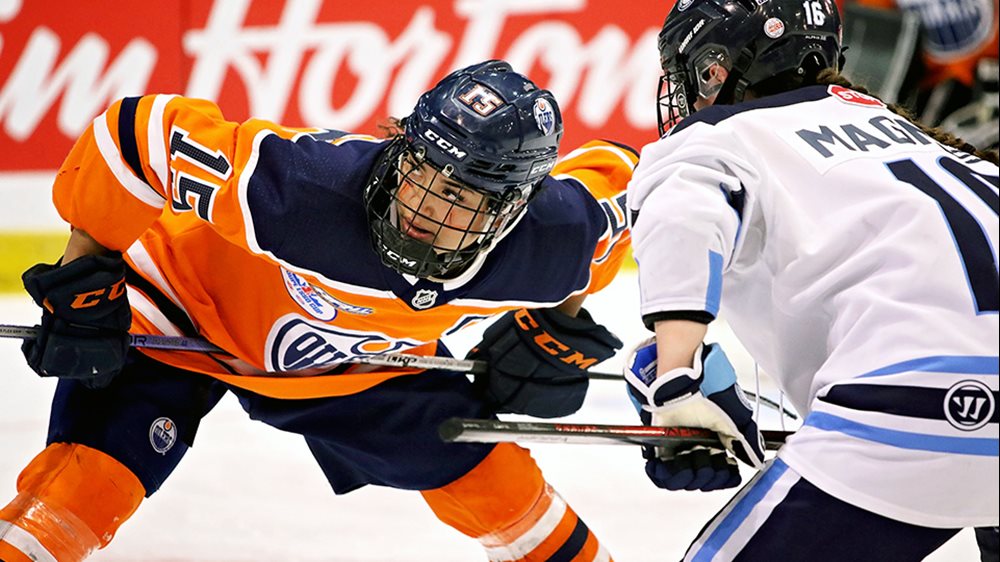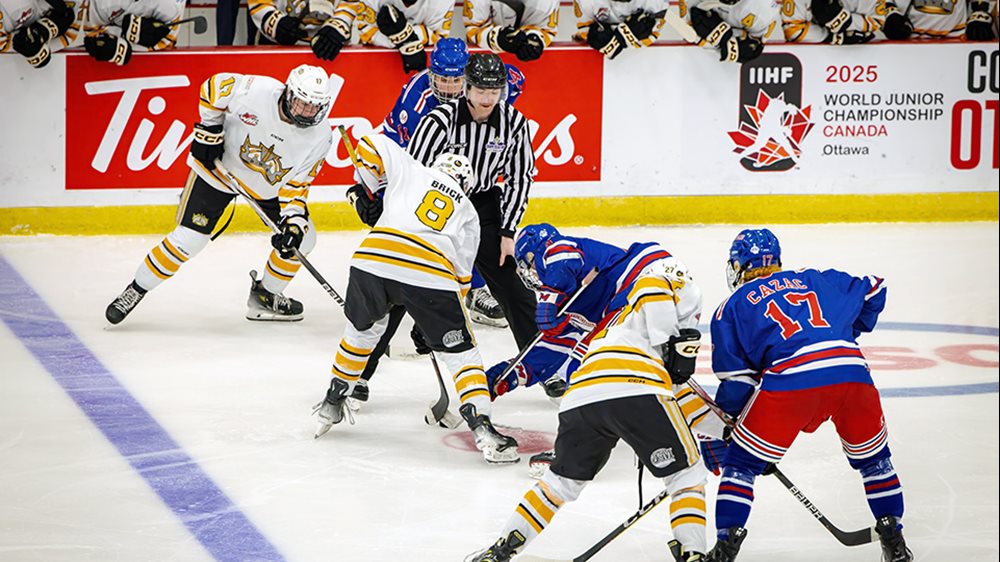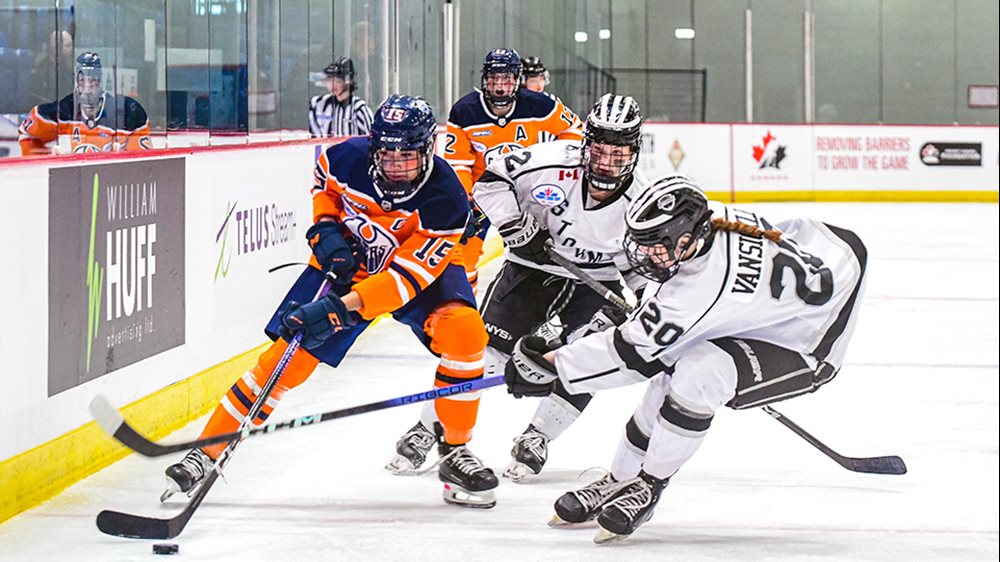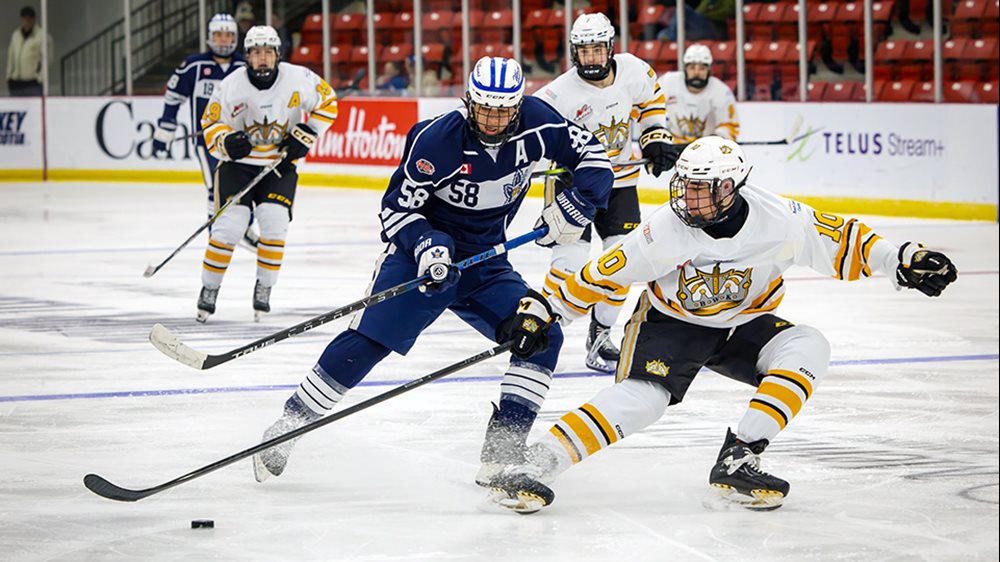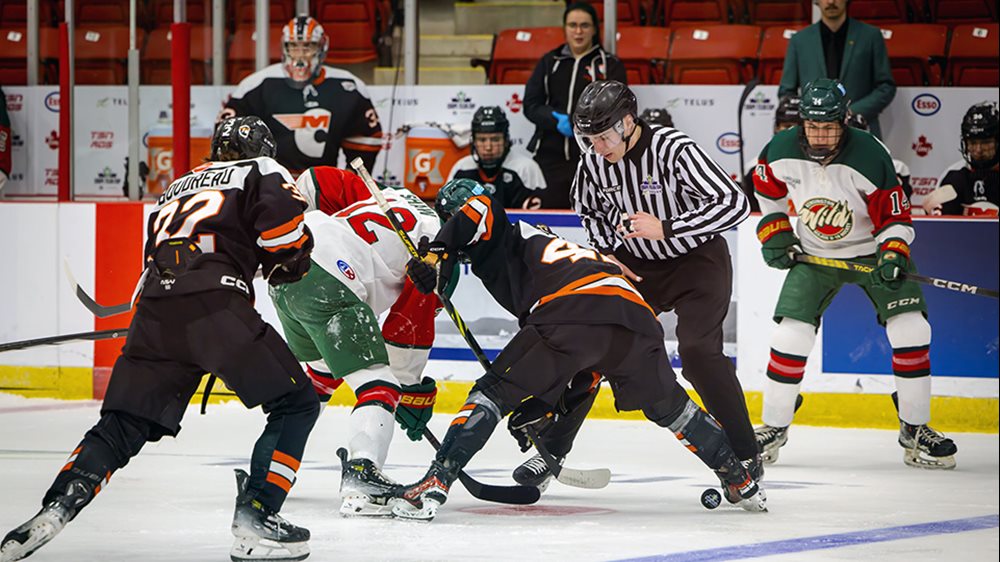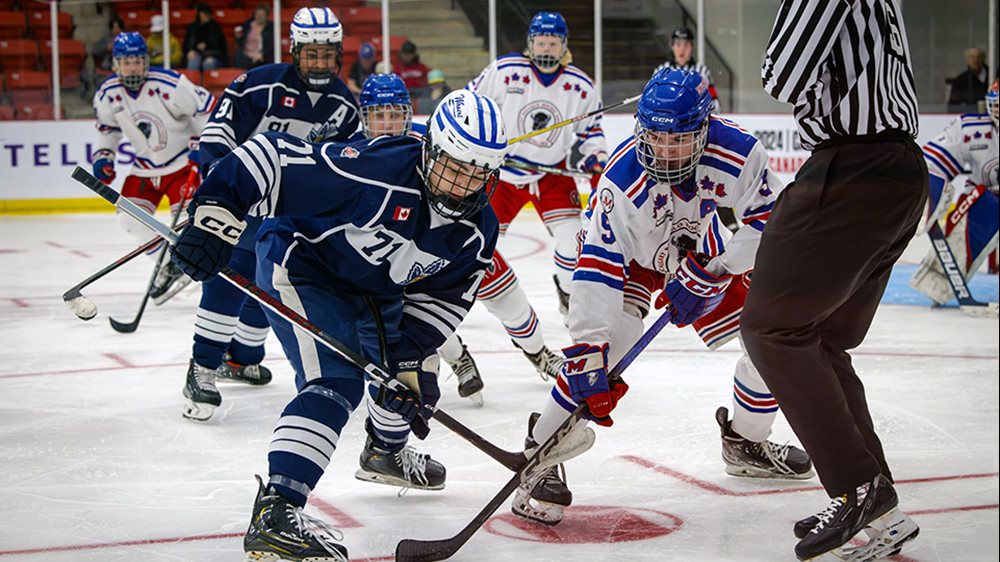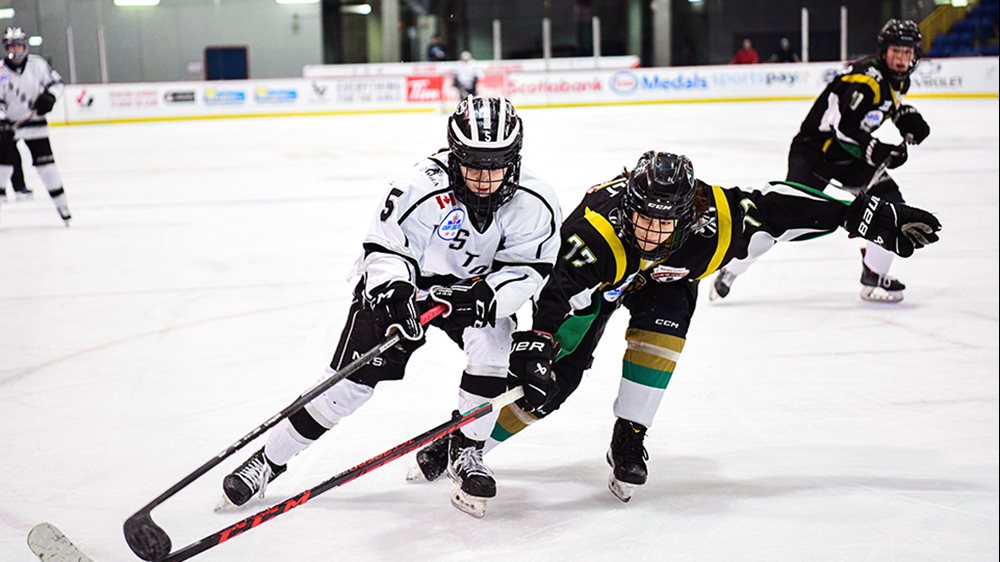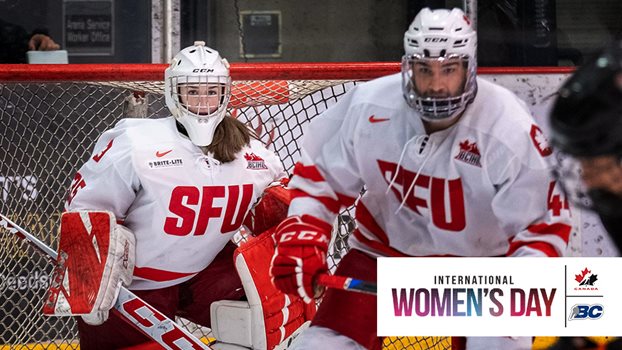
Munro finds her hockey home
The COVID-19 pandemic changed Kayla Munro’s post-secondary plans, but the goaltender landed on her skates at Simon Fraser University, making a little history in the process
The past two years have been anything but normal for Kayla Munro. Like many athletes, the young goaltender’s daily life was shaken up by the global pandemic, as seasons were cancelled and restrictions were put in place. The challenge to find avenues to be able to play hockey became difficult.
For Munro, her journey to continue to play hockey has led her to the unique path of joining the Simon Fraser University (SFU) men’s hockey team. The result has been a talented young hockey player being able to continue in the sport while breaking through barriers.
“I didn't know if I was going to get to play hockey again,” says Munro. “I am just grateful right now to be playing on the SFU team.”
SFU and Munro had a fantastic 2021-22 British Columbia Intercollegiate Hockey League (BCIHL) regular season, going undefeated with a perfect 12-0-0 record. For Munro, she made history throughout the season. She first jotted her name into the BCIHL history books as the first woman to ever play in a league pre-season game on Sept. 25, 2021, when she entered in the third period to take the net versus the Okanagan Lakers. She had a solid outing, stopping 13 of 14 shots in the frame. Munro next made her mark on Oct. 16, 2021, when she became the first woman to start a BCIHL exhibition game, also against the Lakers.
“I was a little bit nervous,” Munro says of seeing her first game action. “Honestly, I hadn't thought about it as being a big milestone. I was nervous because I hadn't played a game in about two years. Last year at Syracuse and the year before that I had shoulder surgery. I talked to a sports psychologist and have learned some really good ways to control my nerves and make them a driving force of how well I play. Although a little nervous, I felt prepared.”
Munro’s crowning achievement, to this point, was on Feb. 5, 2022, when she became the first woman to ever play in a regular season BCIHL game. The 19-year-old took the crease for the third period against the Okanagan Lakers as SFU skated to an 8-5 victory.
For Munro, the original plan was not to rewrite history as a member of the SFU men’s hockey team, in fact it was far from it. Her goal was to play NCAA hockey, and it appeared she had attained that lofty accomplishment when she committed to Syracuse University in New York on a hockey scholarship in 2019.
“It was honestly a dream come true to get the scholarship to Syracuse,” says the product of North Vancouver, B.C. “It had been my goal to play in the NCAA since I started playing hockey. In my opinion, other than the Olympics, it is one of the highest levels you can get for female hockey.”
However, as the world locked down and sports changed, so did Munro’s plans as she chose to stay home with family and not play south of the border. The decision was not easy but was met with support and understanding.
“I went to Syracuse for about a month in 2020,” says Munro. “We couldn't practice or do anything; we were just stuck in our apartments. For family reasons, I decided to come back home. Originally it was just for a semester, but then I decided just to stay home. [Syracuse head coach Paul Flanagan] was supportive. He is an amazing guy. He wants the best for you, and he told me that he wanted whatever made me happy and what was best for my mental health.”
Once Munro decided to stay home in British Columbia, she was left looking for a university to continue her studies. Additionally, she was hoping to find a place to play hockey, a difficult task given all of the restrictions in place associated with the pandemic.
“I applied to Simon Fraser University and was accepted,” says Munro.
With her schooling plans secured, she began looking at hockey options.
“I began looking at everything. Even if they had an intramural team or house league, I just wanted to keep playing.
“I found that SFU had a men’s hockey team and so I emailed [head coach Mark Coletta] asking if I could try out. I told him a little about myself, the teams I played on and the level that I've gotten to in hockey. He was really supportive right away.”
“Kayla needed a spot to play,” says Coletta. “I let her know that she was more than welcome to come try out, and if you're good enough to play, you’ll play. Given her predicament, we wanted to give her a shot.”
The tryout for Munro was successful and after a training camp, she was included on the 2021-22 roster for SFU.
“She can play hockey,” adds Coletta. “She's technically very good between the pipes, she moves around very well. So, making sure she adapts well is the important thing.”
Coletta was clear that Munro made his squad on the merits of her play. He views her as a hockey player, with no designation of gender.
“Kayla’s a tremendous person,” he says. “She's proven every day that she comes ready to work and play.”
Not being treated any differently is something Munro has valued from Coletta.
“He believes that the best players should be on this team,” says the goaltender. “It doesn't matter if you’re a girl or a guy. The first time when we talked on the phone, he said that I was just an equal hockey player, no more or no less. I found that very rewarding and empowering, and it made me feel really good.”
Over the years, Munro has had many positive influences that have helped her as a player and person. While she was with the North Shore Avalanche of the North Shore Female Ice Hockey Association, Munro was first introduced to Jeff Eaton.
“I have two coaches that have stuck with me,” says Munro. “(Eaton) coached a lot with the North Shore Avalanche, came out and did skills with us. Eventually, I got to play for him with the [Pacific Steelers Junior Female Hockey Club]. He's just one of the most knowledgeable hockey people that I know, and so supportive. Coach Eaton just wants to see us succeed and he was the biggest reason why I got my scholarship to Syracuse. I learned a lot of really good things from him.
“The other coach was Delaney Collins. She coached me on the [U18 AAA] Fraser Valley Rush my first year with the team.”
Collins, a fixture on defence with Canada’s National Women’s Team during the 2000s, transitioned her 95 appearances and nine gold medals with the national team into coaching. Collins brought an impressive resume to coaching but also left Munro with a lasting message.
“(Collins) is a big believer in women being empowered,” says Munro. “That we should be considered equal, not just in sports, but everything. I learned from her how to be a confident woman. That it's okay to be strong and have muscles, and not just be dainty and delicate. She helped me find who I was as a goalie and a person. She was a really big role model for me.”
“Kayla was an amazing individual to work with,” recalls Collins. “Her leadership and energy were infectious, and her teammates could count on her to always compete. As a goalie, she was extremely athletic, quick and her puck play was similar to a defender. She is fun to coach and is a great person and role model for young girls.”
After everything Munro has experienced over the last two years, she is well aware that plans can change quickly. However, going forward, the young goaltender has set some goals.
“I want to finish my schooling,” she says. “That’s very important to me. So, for my future, it is continuing my schooling and likely getting a job, while hopefully playing hockey. Honestly, I am grateful to be playing because there was a point I didn't know if I was going to get to play hockey again.”
Munro’s time with SFU will serve her well in the game, and additionally to help build life skills.
“This has been an adjustment for her,” says Coletta. “For Kayla to be able to adapt, I think it will serve her well once this year is over.
“She's worked hard and made a commitment to us. She was ready to play a lot of minutes or play the backup role. Anything to prepare herself for a spot as a starting goalie somewhere next year, whether it's back on the female side or not.”
Through it all, Munro has stayed strong through the challenges.
“During the last few years just staying motivated was my biggest challenge,” she says. “But I'm extremely happy where I am today. I'm very proud.”
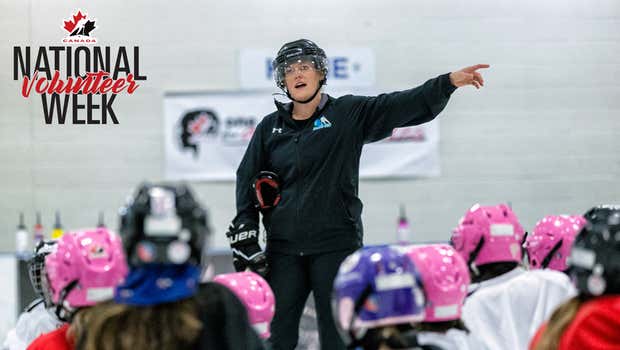
Making an impact in the North
A game-changer in women’s hockey, Kaylee Grant tirelessly gives her time across the territories, volunteering to ensure opportunities exist for women and girls
The first thing Kaylee Grant did when she moved to Yellowknife was find a hockey team.
The operating engineer took a one-year term to gain experience in her industry. Twelve years later, she’s still in the Northwest Territories and hockey has been a reason why she calls it home.
“You gravitate to what you know, and I knew sports,” Grant says. “When you join a sport, you instantly have 17 friends and a group where you feel accepted through a common goal and interest. When I moved to the North, I didn’t know how else to meet friends, so I went to the rink right away.”
Grant grew up around the rink in Antigonish, Nova Scotia. The community was also a hockey hotbed, supporting its Junior A, Junior B and university teams. Being around that passion and community made hockey an important part of her life.
“Playing hockey is what we did,” Grant says. “The community rallied behind our teams and the rinks were full, the atmosphere was great, and hockey was so prominent.”
She played minor hockey in Nova Scotia before moving to Newfoundland and Labrador to play at Memorial University. At 23 years old, she made the move to Yellowknife and knew she would find her community inside a rink.
“I find that the easiest thing to do when you come to a new place to meet people is through sport,” she says. “With joining a hockey team, I was already creating a group of people that were like-minded in interests and similar age. Plus, there are so many opportunities in the North to grow as coaches, players and mentors that have been so helpful.”
Grant’s love for the game wasn’t just as a player—she expanded her knowledge
by getting into coaching while in Nova Scotia. She started as an off-ice
coordinator with the Antigonish Bulldogs women’s under-18 team.
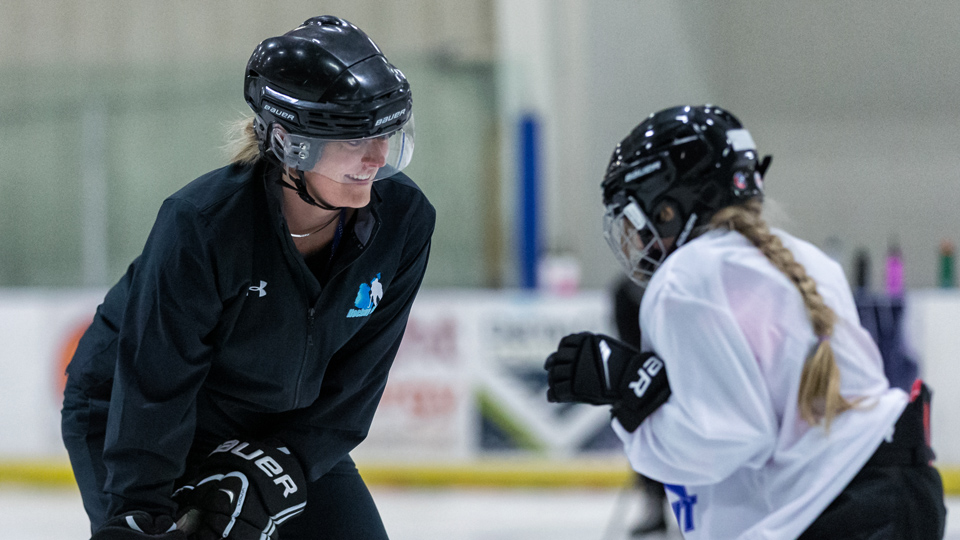
She did her Coach Development 1 training before getting her High Performance 1 training and evaluation certification. She continued to pursue additional coaching certification and training over the years to educate herself and give back to her community.
“I think seeing the female game continuously grow and develop that keeps me interested,” Grant says. “I love to see the progress in my players. I love seeing these players grow and adapt as individuals. Seeing them get involved in coaching is the coolest part.”
Her coaching philosophy is to develop a player’s passion for the game, be a role model and create an environment that is positive for women and girls.
Coaching and mentoring young girls are important to Grant, and she saw that path was through high-level opportunities, particularly by becoming a facilitator to drive more players into the coaching route. She has been working with Hockey North and the Hockey Canada Women Master Coach Developer program, which is focused on removing barriers to coaching education for women.
“Kaylee has volunteered at pretty much every level and she’s getting more involved with training coaches and being a clinician, which is an amazing progression for her,” says Kyle Kugler, executive director of Hockey North and a close friend of Grant. “She’s a great ambassador for hockey by giving back to other coaches through her experiences and helping with their development.”
Through being a volunteer coach, Grant has been able to experience some highlights with her teams, including as head coach for the Arctic Winter Games and Canada Winter Games, and as an assistant coach for Team North at the National Aboriginal Hockey Championship.
“Hockey North has given me so many opportunities and having that support has impacted me as a coach,” Grant says. “I enjoyed every year with those territorial teams and those experiences are a very big reason why I stay here – the coaching opportunities and knowing that we continually have room to grow.”
Another event that Grant was a key volunteer for was the inaugural One For All festival held in Yellowknife in February. It was a four-day event for women and girls from across the N.W.T. and Nunavut that included goaltending clinics, on-ice scrimmages and other off-ice experiences. The event was launched in partnership with Hockey Canada and Hockey North to celebrate the sport and grow grassroots hockey in the North.
“Kaylee is one of our co-leads in the North, and when we set out to deliver this programming in Yellowknife, it was a no-brainer that she would be involved. And typical Kaylee, she just runs with a task and completely owns it,” says Katie Greenway, manager of women’s and girls’ hockey with Hockey Canada. “To have champions like Kaylee that dedicate themselves to their community and sport is so important.”
Giving back through coaching is just what Grant does—it’s like a hobby for her and she does it for others and to see more women in the sport, not for what it could bring to her.
“I’ve known Kaylee for a few years now and she has so much on her plate, but she never says no,” Greenway says. “She doesn’t do it for the accolades, but out of the goodness of her heart with a smile on her face. She’s fantastic and is really impacting everyone that she comes across.”
Grant’s impact on hockey in the North has been felt by many of the girls she has coached, mentored and played with over the past 12 years, but it’s the bigger picture that is most important to her.
“I’m not going to say that myself, individually, has drastically impacted female hockey in the North. I think I am a very small portion of what’s been going on in the North in the last 10 years,” Grant says. “I would like to think that I have helped develop more female coaches and I’ve been a good role model. I think if I have impacted hockey in the North, its pushing players to want to coach a little bit, but it’s a collective—everyone has left their mark on the female game.”
For Kugler, as the lone administrator for Hockey North, having volunteers like Kaylee is so critical to the work and development of hockey players.
“I think volunteers are essential for the delivery of anything in small communities in the North,” he says. “[Kaylee] takes on more than we even realize. Coaches have a huge influence on teams and athletes and she’s a positive role model and advocate for female hockey. She’s selfless with her time and she’s just an awesome person.”
Interested in becoming a coach? Visit HockeyCanada.ca/Coaching, or contact your local hockey association or Hockey Canada Member for more information.
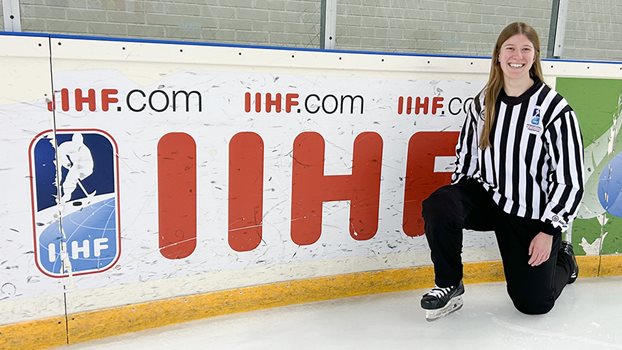
Life between the lines
A late starter in hockey, Ali Beres didn’t let that stand in her way of reaching her goals and setting herself up for a successful second act as one of Canada’s top young linespersons
Once Ali Beres sets her sights on a goal, she will most likely accomplish it.
Switching from ringette to hockey to transitioning to officiating after her U SPORTS hockey career and embracing other athletic pursuits, Beres’ determination keeps her chasing new goals.
“I’m lucky to have athletics be a huge part of my life growing up,” says the 27-year-old. “I feel very fortunate to be involved in sports and at the level that I am with the opportunities I’ve had.”
Growing up in Lions Bay, B.C., about 30 minutes from Vancouver, Beres and her sister Maegan played ringette as there were no girls’ hockey programs. When she was 13 years old, she switched to hockey, intending to play at the university level.
Transitioning from ringette to hockey required Beres to learn new skills, including stickhandling and shooting the puck.
“When I switched from playing ringette to hockey, there was a skill and knowledge gap,” she says.
A coach told her that she was behind her peers at that age and probably shouldn’t bother, but her drive led her to participate in skill development camps and shooting 200 pucks in the family garage so she would be able to play.
“I remember that conversation with this coach when I was 14 years old. That moment shaped me and who I am today,” says Beres. “It taught me that if you want something badly and you put in the effort and hard work and you have the determination, you can still achieve your goals. Most importantly, to never give up on something you love.”
That love and passion led her on a successful hockey path, including playing for B.C. at the 2013 National Women’s Under-18 Championship and varsity hockey at Western University in London, Ontario, where she won a U SPORTS national title in 2015, a silver medal at nationals and two Ontario University Athletics (OUA) championships.
As Beres finished her university career, she thought about what would come next. She knew she wanted to stay involved in the game and leaned on an aspect of the game she used to participate in – officiating.
“I wasn’t ready to just hang up the skates and call it quits after my U SPORTS career. The rink has been a part of my life since I was three,” she says. “As soon as the final game ended, it was so emotional. I knew after that I was going to have to get a job and that I wasn’t going to be playing anymore. I remembered that I loved officiating growing up.”
Beres decided she wanted to put on a new jersey, play on a new team and see where officiating could take her. After graduating, she got re-certified in Ontario.
“I just kept skating lots of games with so many different people and games as possible and learn as much as I could,” she says. “I saw so many people ahead of me in the program and saw all their accomplishments and telling my mentors that those are the assignments that I’d love to take on.”
Since transitioning to officiating, Beres has had the opportunity to participate in the Hockey Canada Officials Program of Excellence (OPOE), which is a performance pathway for officials to reach their high-level goals.
Since then, she has been a linesperson at some significant events, including the 2014 IIHF U18 Women’s World Championship (Division 1B) and the Professional Women’s Hockey League Battle on Bay Street game between Toronto and Montreal earlier this year.
“I’m grateful to have had so many opportunities through officiating,” says Beres. “What I love about officiating is that you’re still part of the game. It’s intense … there’s pressure on your shoulders and you’re still competing as an athlete. It is our job to make sure the game is played fair and safe.”
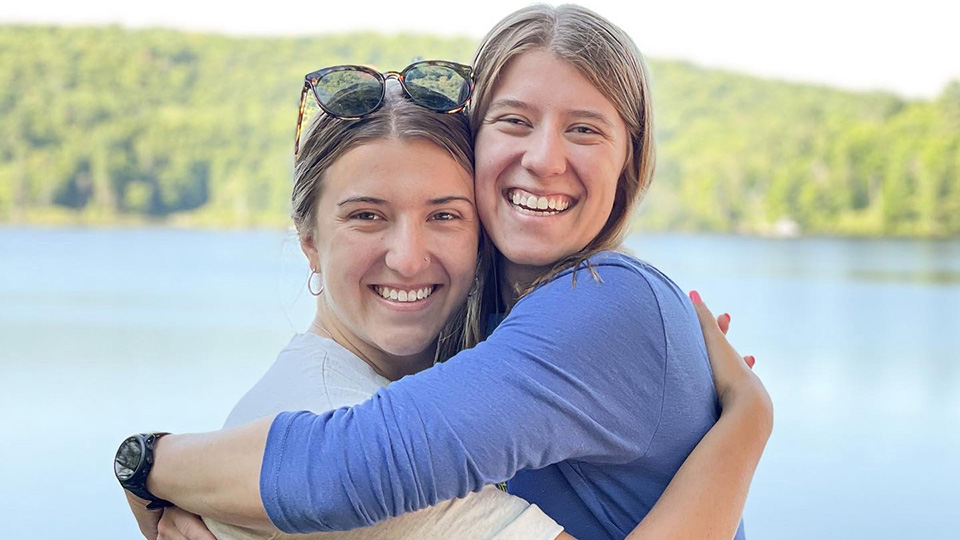
Beres wouldn’t be able to balance life as a solution engineer with a procurement company, officiating and competing in triathlons without the support system of her family, particularly Maegan.
“We are best friends and we’ve always been competitive,” she said. “We’ve always tried to push each other. Our parents instilled solid values in us. While we were competitive, we also supported each other, and knowing that each other’s successes doesn’t mean the other isn’t successful.”
Like Ali, Maegan had hockey aspirations that she was determined to achieve. She played NCAA hockey for Boston College and with the Toronto Six of the Premier Hockey Federation, and won a silver medal with Canada at the 2017 IIHF U18 Women’s World Championship.
“We’ve always been super close, and she turned into such a big role model for me and being the younger sister, you kind of idolize your big sister,” says Maegan. “When I had a lot of success in my hockey career, she was one of the closest people to me and I always leaned on her for advice and support.”
Being athletically fit is important to stay at high-level hockey pace, but it also helps Ali stay mentally fresh and healthy and able to balance her professional career as well. Outside of officiating, Ali competes in triathlons, a sport she quickly fell in love with.
“The players are giving 100 per cent, so we need to be able to match that and give it our all too. I was a little bored of the gym, so I wanted to push my athletic comfort zone, so I signed up for an Ironman 70.3 (also known as a half-Ironman) and I got really addicted,” Ali says.
As Ali continues to set goals for herself – including officiating at the Olympics, her sister knows her drive is what will get her there.
“Once she has a glimpse of that goal, I just know she will do everything in her power to get there and accomplish it,” says Maegan. “I am very proud of her and what she’s accomplished and seeing her transition from her playing career in hockey into officiating. I’m excited to see where this journey takes her.”
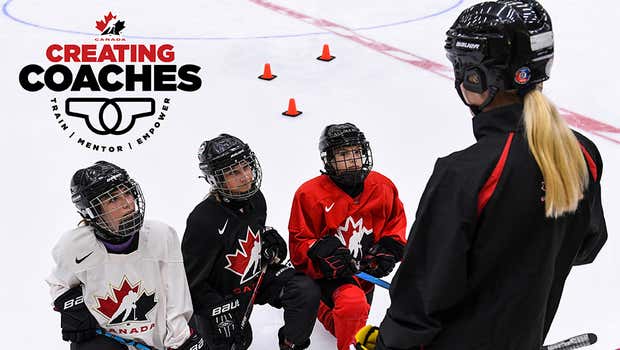
Eight student-athletes to participate in Creating Coaches program
Creating Coaches’ third cohort runs until end of 2024-25 season
CALGARY, AB – Hockey Canada and U SPORTS have announced the eight student-athletes who have been selected to join Creating Coaches, a program designed to increase the number of women coaching hockey in Canada, as part of its third cohort which will run during the 2023-24 and 2024-25 seasons.
Launched in 2021 through a partnership between Hockey Canada, U SPORTS and the Hockey Canada Foundation, Creating Coaches provides training and mentorship to current U SPORTS student-athletes who are concurrently looking to begin their coaching careers. Participants in the program serve as an assistant coach with a U13, U15 or U18 girls’ hockey team for the duration of the two seasons and receive coach education, professional development opportunities and an honorarium.
This year’s cohort includes student-athletes from eight U SPORTS women’s hockey programs across three of its conferences:
• Alexis Anonech (York University, OUA)
• Emmy Fecteau (Concordia University, RSEQ)
• Lyndsey Janes (Mount Royal University, CW)
• Madison Laberge (Nipissing University, OUA)
• Isabelle Lajoie (University of Alberta, CW)
• Sophie Lalor (University of Saskatchewan, CW)
• Sarah-Maude Lavoie (McGill University, RSEQ)
• Chihiro Suzuki (Guelph University, OUA)
“We are thrilled to welcome these eight accomplished student-athletes to Creating Coaches and look forward to working with them during the next two seasons,” said Marin Hickox, Hockey Canada’s vice-president of women and girls’ hockey. “Creating Coaches is an important program to support and develop hockey’s next generation of leaders and we are grateful to the U SPORTS coaches who nominated this talented group.
“Girls who have been coached by a woman are more likely to transition into a coaching role at the end of their playing careers, and it is our intention that this program will positively influence the recruitment and retention of girls and women in leadership roles in the sport.”
Since its inception, Creating Coaches has included student-athletes from 16 U SPORTS women’s hockey programs and all four of its conferences.
“The eight student-athletes selected to join Creating Coaches are tremendous ambassadors for hockey and university sport in Canada,” said Lisette Johnson-Stapley, chief sport officer at U SPORTS. “We have already seen the positive impact that this program has had inspiring young girls in communities across the country and we are excited for Alexis, Chihiro, Emmy, Isabelle, Lyndsey, Madison, Sarah-Maude and Sophie to begin their coaching careers while continuing to represent their universities with pride as student-athletes.”
The Creating Coaches selection committee includes representation from Hockey Canada, U SPORTS, Hockey Canada’s Members and the Hockey Canada Foundation Board of Directors.
During National Coaches Week, Hockey Canada is celebrating the positive impact that coaches have on athletes in communities from coast to coast to coast, with #ThanksCoach resources and features shared here.
To learn more about Hockey Canada, please visit HockeyCanada.ca, or follow along through social media on Facebook, X and Instagram.
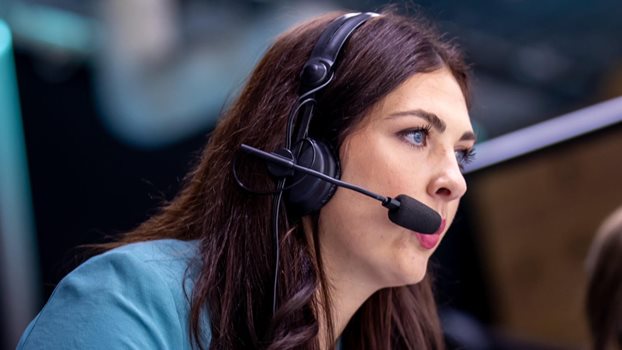
In my own words: Kenzie Lalonde
The Ottawa native reflects on her journey, from growing up playing hockey to getting her start in broadcasting and memorable moments wearing the headset for TSN
I'm someone who says yes to things. I go back to this quote I came across in high school: you get in life what you have the courage to ask for. Whether it was lacing up my first pair of skates, moving to the Maritimes or putting on a headset for the first time, I found the courage to say yes to opportunities that scare me.
I grew up in a household of hockey fans. Every morning before school, I
would eat my bowl of Froot Loops and watch SportsCentre on TSN, amazed that
people could talk sports for a living. My father and my older brother both
played hockey, so it was natural for me to follow in their footsteps. I
initially played boys’ hockey, switching to girls’ hockey in U11. That
accelerated my passion for the game because I walked into a dressing room
and immediately met 23 girls that loved the same sport I did. To this day,
I’m still close with some of my minor hockey teammates.
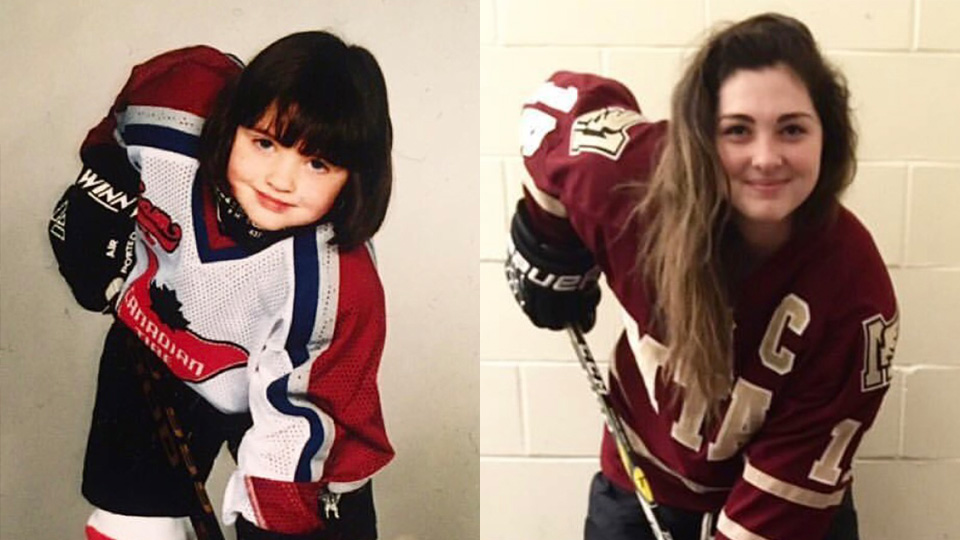
In Grade 12, I was playing for the Ottawa Junior Senators. My teammates were committing to colleges, but I didn’t know what I wanted to do. I was at a crossroad. I wanted more balance between hockey, school and life. My student teacher at the time, Andrea Leacock, recommended I check out her alma mater, Mount Allison University. From the moment I met the coach, toured the town and met a few of the players, it felt right. I had never been to the Maritimes before that trip, but I chose to call Sackville, New Brunswick home for the next five years, playing hockey, studying business and discovering television along the way.
I knew I wanted to turn my hobby into a career in my fifth year of
university when I saw first-hand the excitement an interview could bring to
a young athlete. I had a chance to volunteer at a local cable channel,
Eastlink Community TV. It was my first time filming a story, we were
covering a girls’ junior high school basketball championship. I went up to
the MVP and asked her the good old question, “How does it feel to have
won?” The look of sheer terror, happiness and anticipation all mixed into
one emotion, surrounded by her giggling teammates, was priceless. It was in
that moment I realized I was seeing myself, and what it would have been
like if someone came up to me and my teammates wanting to interview us
after a win, recognizing our accomplishment. I knew from that moment on, I
wanted to provide women athletes an opportunity to have their
accomplishments honoured and voices heard.
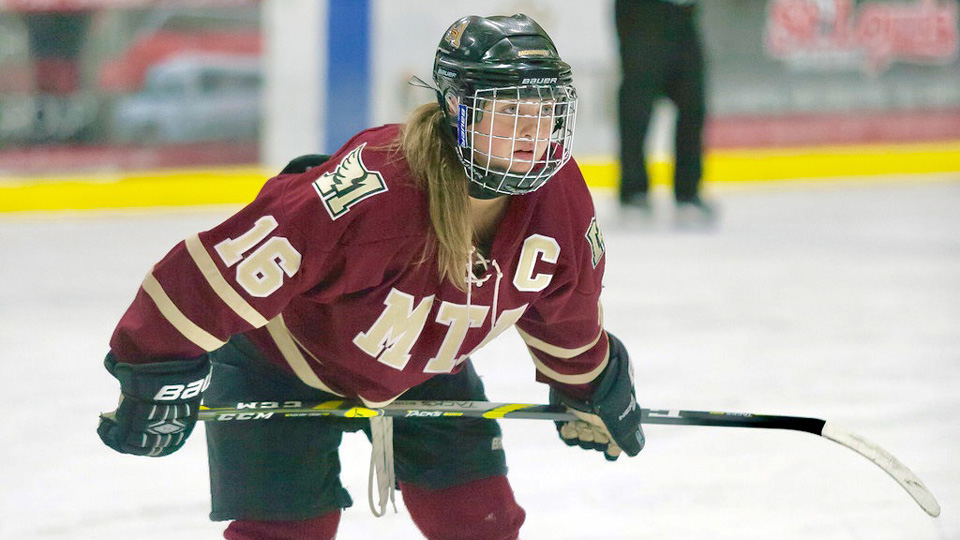
When I joined Eastlink Community TV full-time, it was my manager, Brett Smith, who encouraged me to try play-by-play. For the first few weeks, I got my feet wet—I didn’t know much about live broadcasting. I learned quickly that in television, you learn by doing; it’s all about the reps. I knew I would either sink or swim, and I swam. Within two months, I was hosting the Halifax Mooseheads broadcasts, and within three months, I was calling hockey. Five months later, I was calling soccer, basketball, volleyball, even ringette. I began hosting a weekly community show, filling in as a camera operator and producing stories. I tried it all and loved it. I gained an appreciation for grassroots sports and began to feel a responsibility every time I called a game. A responsibility to pronounce names correctly, introduce viewers to the person behind the athlete and, most importantly, give an athlete their moment.
The night before I called my first QMJHL game on television, I was nervous.
It was going to be the first time a woman provided play-by-play commentary
for the league on television. People often ask me what that was like. Well,
I felt as though if I did great, I did the job, but if I failed, I’d hinder
future opportunities for women. The night before the game between the
Halifax Mooseheads and Charlottetown Islanders, I got a phone call. It was
Leah Hextall, someone who knows first-hand, on a much larger scale, the
feeling of carrying the weight of your gender on your shoulders. She gave
me some great advice—trust yourself, because you’ve earned this, and be
present. Two tips I still remind myself.
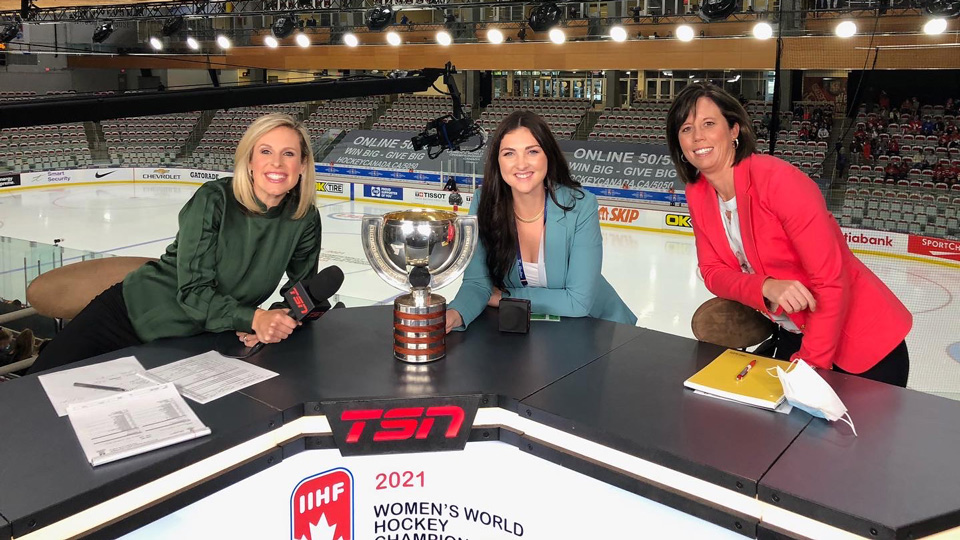
It wasn’t too long after that, I got another phone call came from TSN for the 2021 IIHF Women’s World Championship in Calgary. This was the first time Group B games were going to be televised, so they were looking for a second commentary team. I had a few weeks to prepare, get comfortable with international women’s hockey and European names, and go into the Calgary bubble to work with the network that inspired this Froot Loops-loving, sport-obsessed nine-year-old.
Since then, I have had the opportunity to be a part of some incredible sporting events. Reporting on women’s hockey at the 2022 Olympic Winter Games was very special. The event was so unique, I’ll never forget that experience in Beijing and how it shaped me as the reporter I am today in Montreal. The most recent World Juniors in Halifax was very memorable because I returned to the rink where my television career started, in the same role, as a rink-side reporter, on the same ice. The IIHF U18 Women’s World Championship in Wisconsin stands out for me because for the first time, the U18 women were receiving televised coverage and I was a part of it in the booth. Exposure of the women’s game is vital for growth, and I am proud to work with fellow team members that want to even the playing field.
😂🙏🏼 what a week https://t.co/qVlAMdy84g
— Kenzie Lalonde (@KenzieTSN) September 7, 2022
And that’s why I love television—it’s a team sport. The crew and staff behind the scenes of a broadcast is where the magic is made. We all have to rely on each other; a skill I developed in hockey. I learned how to trust my teammates, who are now a colour commentator, a camera operator or the producer, who is like a coach. I know what it’s like to be a rookie, to value other people’s sacrifices and, most importantly, how to fight when the odds are against you.
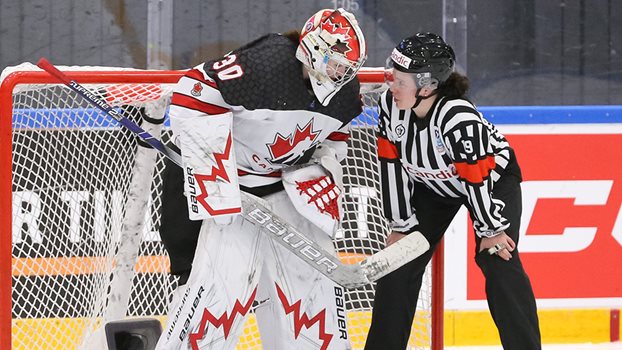
Berezowski’s officiating dream comes true with newborn by her side
Three months after giving birth to her second daughter, Jenn Berezowski was back on the ice refereeing at the IIHF U18 Women’s World Championship
Jenn Berezowski always wanted the opportunity to officiate at a top-level IIHF tournament.
There was just one small dilemma. Berezowski had recently given birth to her second daughter, Hannah.
“When I got the phone call in October 2022 to do the U18 Women’s Worlds in January, I was about a month postpartum with my second daughter,” Berezowski recalls. “It was going to be tight with the timing, but I couldn’t say no.”
So, a month after Hannah was born, Berezowski resumed officiating games.
“I was back on the ice again and with my daughter attached to my hip,” she says.
When it came time to leave for Sweden, Berezowski, along with her mother
and baby Hannah, made the trip from their home in Trenton, Ont., across the
Atlantic. Meanwhile, her husband and their eldest daughter, three-year-old
Scarlett, remained at home and watched as Berezowski refereed three games,
including the gold medal game that saw Canada beat Sweden 10-0 to defend
its world title.
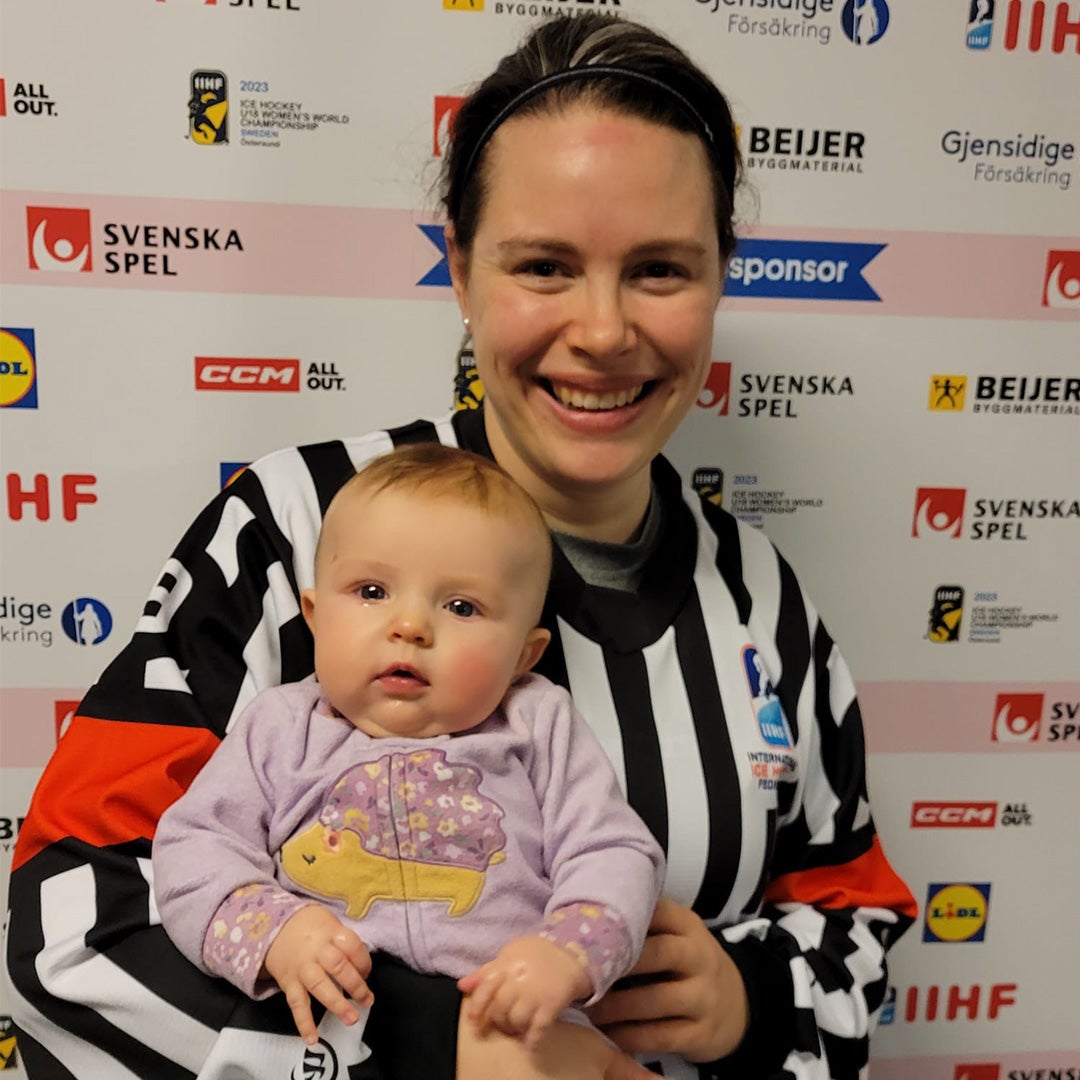
Whether it was at home or on the road, Berezowski credits friends, family and colleagues for supporting her and Hannah.
“Everyone has taken turns coming to the arena with me so that I can be away from home and continue to ref but also have her with me there so I can feed her and keep her healthy,” Berezowski says. “My colleagues have been extremely supportive, no one has blinked an eye about me feeding my baby in between periods or having a babysitter hanging around. In doing that, they are helping normalize this path locally, nationally and internationally.”
Since the U18 worlds in Sweden, Berezowski has returned to officiating various leagues across Ontario with her daughter by her side. This week, she is part of the crew working the U SPORTS Women’s Hockey Championship in Montreal.
With the added logistics of travelling with her baby, on top of being a
mother of two and a referee, Berezowski is also a chartered professional
accountant. She admits that the spring season is one of her busiest times
of the year, with provincial championships and playoffs happening at the
same time as the Canadian tax season.
“It’s all about the support I receive from everyone, including my bosses
who have been very generous with allowing me to have flexible hours,”
Berezowski says. “During the spring, tax season and championships come to a
peak, so it’s all about giving some and taking some and being one of the
hardest workers out there.”
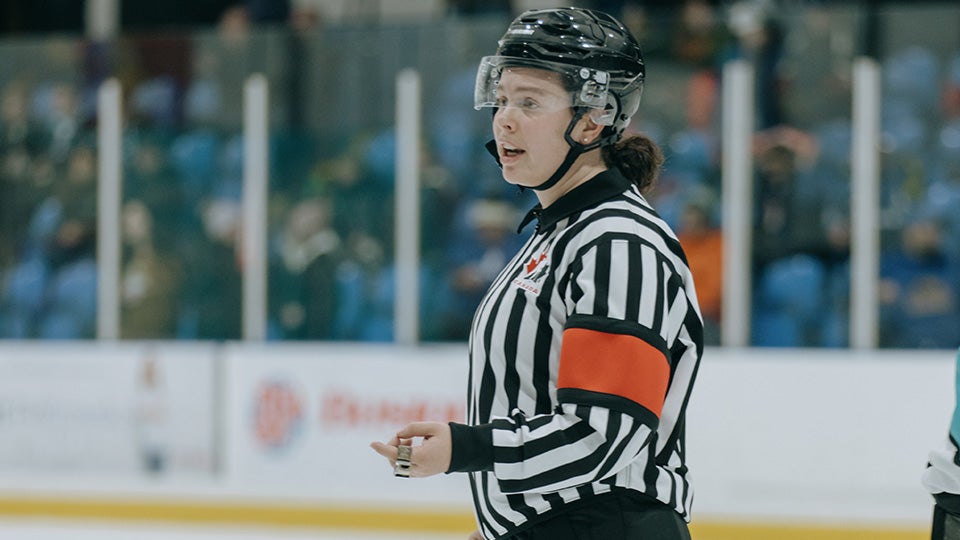
Normalizing newborns at the rink
Since donning the stripes when she was 16 years old, Berezowski says she has only once seen a mom with her newborn at the rink. However, she is optimistic that over time, it will be commonplace.
“We used to have to choose one of the two. I would’ve had to choose between continuing to do this or is it time to have a family,” Berezowski adds. “Now, people have opened their minds to the possibilities and you can do both. I’ve been lucky to be able to pursue everything.”
Berezowski is also in contact with the growing community of women officials. Whether it’s sharing experiences or bouncing thoughts and ideas off each other, the community continues to be very supportive. By sharing her story, Berezowski hopes to serve as a role model for other women, particularly new moms.
“I have a lot of colleagues that are young, and they haven’t started families yet, and through that online group, we’re transparent and showing that we’re in 2023, we can do this stuff if we want to, and I love that I can show that within my province and on the ice,” she says.
At the end of the day, Berezowski is encouraged by the support from the hockey community.
“It’s super rewarding to have a career, be an official on the ice and a mom, too,” she says. “Seeing people like Natalie Spooner and all she’s doing, we’re showing moms what is possible, and that we can do anything that we want to once we set our minds to it.”
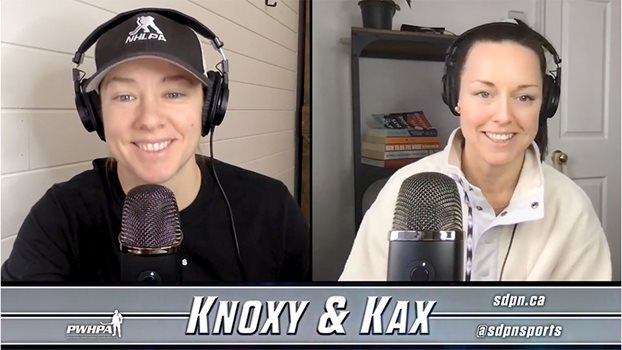
Knox’s podcast highlights influential voices
From between the pipes to behind the microphone, Liz Knox is advocating for representation and inspiring young fans and players by sharing the influential voices in women’s hockey
Seven years old, Knox watched the likes of Danielle Goyette, Cassie Campbell and Kim St. Pierre power Canada to a dominant 8-1 victory over China at the Kitchener Memorial Auditorium during the 2000 IIHF World Women’s Championship.
“That was enough for me to latch onto that dream of one day wanting to be on the Olympic team,” Knox says.
Since that game 23 years ago, the Stouffville, Ont., native has had a successful career as a goaltender, winning everywhere she played. In university, she helped lead the Wilfrid Laurier Golden Hawks to four straight Ontario University Athletics (OUA) championships . She won gold at the 2011 Winter Universiade as a member of Team Canada and in 2018 captured the Clarkson Cup with the Markham Thunder in the now-defunct Canadian Women’s Hockey League (CWHL).
She also had a couple of chances to wear the Maple Leaf with Hockey Canada, including a silver medal with Canada’s National Women’s Under-22 Team at the 2009 MLP Cup and three appearances with Canada’s National Women’s Team.
As her playing career progressed, Knox found herself surrounded by influential women who inspired her to find her voice and become a leader.
“From minor hockey coaches to Laurier where I had some great captains that I looked up to and then at the CWHL, my first captain was Jayna Hefford, so I was really put in an environment where I had great leaders to learn from," says Knox, who ended her playing career in 2019. "As I aged and found my footing in the sport, it was almost an unconscious thing where if I wanted to get things done, I would be a part of it.”
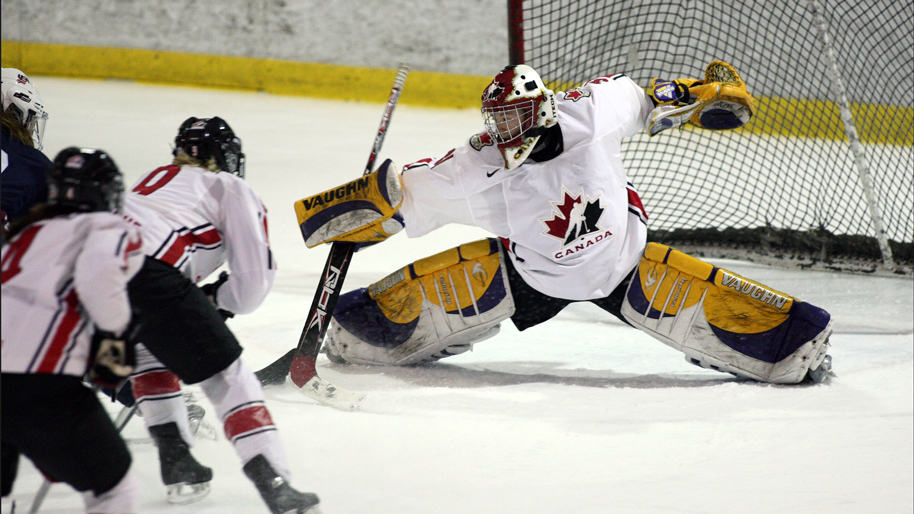
During her time in the CWHL, Knox also served as the co-chair of the CWHLPA and later became a founding board member of the Professional Women's Hockey Players Association (PWHPA). In 2020, when the COVID-19 pandemic and Black Lives Matter movement called for a time of reflection, Knox made the decision to step down from the board, inviting Sarah Nurse to join and be an influential voice.
“I wanted to make sure [Sarah Nurse] had a voice at the table,” says Knox. “We’re really lucky to have her as an advocate for our sport and she’s also doing so much outside of hockey, it would have been such a missed opportunity if I hadn’t invited her."
Today, Knox does commentary during PWHPA Dream Gap Tour games, while serving as an advisor to the PWHPA. Away from the rink, she is a firefighter with the Town of Oakville, and if that wasn’t enough on her plate, she along with long-time friend [and fellow Team Canada alumna] Karell Emard, launched a podcast called The Knoxy & Kax Show on SDPN last year.
“Before the last Olympic Games, [SDPN CEO] Adam Wylde came up to me and said, ‘We want to do a women’s hockey podcast and I want you to be the host,’ and it’s been so fun,” Knox says.
The podcast, which began as a partnership between SDPN and the PWHPA, features some of the biggest names in women’s hockey sharing their stories and experiences in and around the game. Past guests include familiar names like Marie-Philip Poulin, Jocelyne Larocque, Sarah Nurse, Emily Clark and Natalie Spooner.
“There’s a huge learning curve but what a cool opportunity to hear from these players, hear about their journey and help people understand why what we are is so important,” says Knox.
“After two seasons, we’re doing it on the fly and feeding off each other,” Emard says. “When Liz and I were playing, we never had a chance to see and get to know our idols, so I think it’s super important for our listeners to listen to not just national players, but professional players too, so they can hear different stories and that there is more to achieve." "For too long, we’ve judged our career on whether or not we made the national team, but a very successful career is also playing professional and being successful within those leagues.”
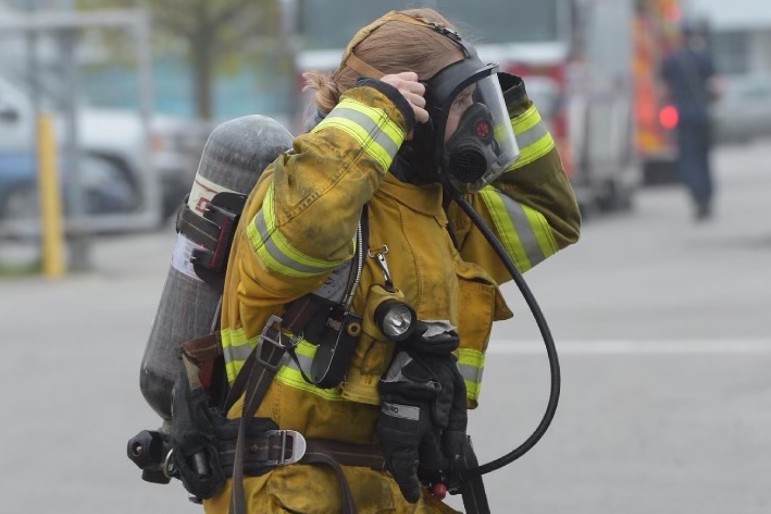
In addition to hosting a podcast and her work with the PWHPA, Liz Knox is also a firefighter with the Town of Oakville. (Photo supplied)
Inspiring the next generation
Through events like the recently completed Rivalry Series and 2023 IIHF Women’s World Championship next month in Brampton, Ont., Knox hopes the added exposure to women’s hockey brings new fans and athletes to the sport.
“It’s representation and the fact you can see yourself in that person out there,” says Knox. “Now, you get to see people like Sarah Nurse, like Cassie Campbell, all these incredible people and you see them crushing these goals on the ice or on national broadcasts, in a space that hasn’t traditionally welcomed them. It’s going to invite and inspire more dreams, more people and young athletes to chase those dreams.
“The more inclusive we make this space, the more we will learn about ourselves and each other and make for some fun hockey to consume.”
As women’s hockey continues to expand and grow, Emard has no doubt that Knox will continue to play a big role in leading the way.
“She’s always been the voice of the players,” Emard says. “The players are very trusting of her and I hope she keeps doing it because we all feel like we are in good hands when she is around.”
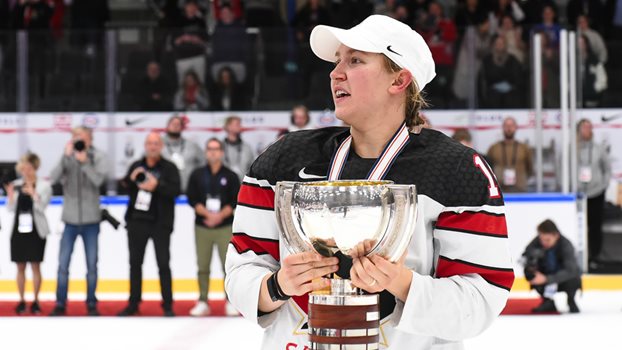
Inspiration through leadership
On International Women’s Day, some of the most influential women in hockey speak about the importance of inclusion and representation in different positions of the game
In the hockey community, the women’s game has never been stronger.
To celebrate International Women’s Day, Hockey Canada has collaborated with some of the most successful women in the game to answer one question:
Why is it important to see women in influential positions in the game?
Alex Clarke (Drake, Sask.)
Clarke began officiating when she was 11 years old. and became the first woman to officiate in the Western Hockey League (WHL) in September 2021. She is also one of the first women to officiate in the American Hockey League (AHL), and was chosen to represent Canada on the ice as an official at the 2022 Olympic Winter Games.
Angela James (Toronto, Ont.)
A Hockey Hall of Fame inductee, four-time world champion and a member of the Order of Canada, James recorded 33 goals and 54 points in 50 games played with Canada’s National Women’s Team from 1990-1999. Today, James is the co-owner and general manager of the Toronto Six in the Premier Hockey Federation.
Brianne Jenner (Oakville, Ont.)
A two-time Olympic gold medallist, three-time world champion and long-time alternate captain, Jenner is a leader on and off the ice with Canada’s National Women’s Team. She is closing in on 150 games wearing the Maple Leaf, recording 106 points (41-65—106) to rank 13th in all-time Team Canada scoring.
Kori Cheverie (New Glasgow, N.S.)
Since joining the Team Canada program in 2018, Cheverie has become a familiar face behind the bench, helping guide Canada to gold medals at the 2021 and 2022 Women’s Worlds, and the 2022 Olympics. She made history last spring, becoming the first woman to serve as a coach with a men’s national team at the 2022 IIHF U18 World Championship.
Manon Rhéaume (Lac Beauport, Que.)
Rhéaume became the first—and still only—woman to play in an NHL game with the Tampa Bay Lightning in 1992. As a member of Canada’s National Women’s Team, the netminder is a two-time world champion and a silver medallist at the 1998 Olympics—the first year women’s hockey was included in the Games.
Marian Jacko (Wiikwemkoong First Nation, Ont.)
Elected to Hockey Canada’s Board of Directors in December 2022, Jacko is the Assistant Deputy Attorney General for the Indigenous Justice Division of the Ontario Ministry of the Attorney General. Currently, she is the President of the Little Native Hockey League ("Little NHL"), the President of Anishnawbe Health of Toronto, and the head coach of the U18A team in North York.
Stephanie White (Toronto, Ont.)
A former coach of women’s hockey who won gold with Canada’s National Women’s Team in 2007 and silver in 2009 with Canada’s National Women’s Under-18 Team, White is currently BC Hockey's chair of the board. She is currently the director of athletes at the University of Windsor and previously served as the director of sport at Western University.

2022 BFL Female Coach of the Year winners announced
22 recipients selected across Community, Competitive and High Performance categories
CALGARY, Alta. – In partnership with BFL CANADA, Hockey Canada has announced the national and provincial/territorial winners of the 2022 BFL Female Coach of the Year Award, which recognizes coaches who led by example in demonstrating fair play and a commitment to the development of every player and staff member, and made significant contributions to the game during the 2021-22 season.
Nominated by parents and players from coast to coast to coast, three national and 19 provincial and territorial award winners were chosen by the selection committee, which included Olympic gold medallists Cassie Campbell-Pascall, Gina Kingsbury and Caroline Ouellette, Teal Gove of Hockey Canada and Sacha Vaillancourt, vice-president and national practice leader of sports and leisure with BFL CANADA.
Sarah Hilworth, the head coach of the women’s hockey team at the University of New Brunswick, earned the national award in the High Performance category and will receive a $5,000 bursary and an invitation to Canada's National Women's Team camp this summer. Since joining the Reds, Hilworth has consistently demonstrated the importance of sportsmanship, empowered her players to make a difference on and off the ice and contributed greatly to her community.
Laurence Beaulieu and Amy Doerksen are the national winners in the Competitive and Community categories, respectively, receiving a $2,500 bursary and Hockey Canada merchandise package.
A former professional hockey player with the Canadiennes de Montréal, Beaulieu’s coaching career began five seasons ago. Through her passion for the game, the Titans du Cégep Limoilou assistant has already made a name for herself behind the bench.
As a Timbits U7 coach in Brandon, Man., Doerksen has gone above and beyond to create a positive hockey experience, while providing a safe and inclusive environment for all participants. Additionally, she has emphasized the importance of having fun through organizing team activities and special events for her local hockey association.
In addition, 19 provincial and territorial award winners were recognized and will each receive a $1,000 bursary.
Winners in the Competitive category included: Mandy Layden (Alta.), Brittany Kirby (B.C.), Tess Houston (Man.), Abby Clarke (N.B.), Grace Hatcher (N.L.), Josanne Deveau (N.S.), Stephanie Pascal (Ont.), Rebecca Babiak (P.E.I.) and Tori Spencer (N.W.T./Y.T./Nvt.).
Winners in the Community category included: Lesley Burton (Alta.), Heather Neale Furneaux (B.C.), Katie Peddle (N.B.), Monique Organ (N.L.), Erin Crowell (N.S.), Kiara Jefferies (Ont.), Nadine Moore (P.E.I.), Laetitia Létourneau (Que.), Barb Bryden (Sask.) and Jessica Cox (N.W.T./Y.T./Nvt.).
For more information on Hockey Canada, please visit HockeyCanada.ca, or follow along on Facebook, Twitter and Instagram.
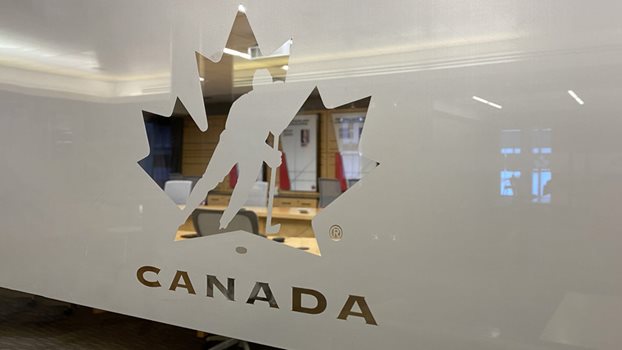
Hockey Canada adds two key staff
Natasha Johnston named director, sport safety; Marin Hickox hired as director, women and girls hockey
CALGARY, Alta. – Hockey Canada has announced that prominent Canadian sport executives Natasha Johnston and Marin Hickox have joined the organization to lead its strategies in safe sport and women and girls hockey, respectively.
“We are thrilled to welcome Natasha and Marin to Hockey Canada in these brand-new positions that focus on advancing two key strategic areas of our organization,” said Hockey Canada president and chief operating officer, Scott Smith. “They both have invaluable experience from across the sport industry and will both play critical roles to ensure hockey is a safe and inclusive sport for all participants.”
As director of sport safety, Johnston will oversee Hockey Canada’s safe sport portfolio, which includes developing sustainable solutions to address player safety and maltreatment. Johnston will also work with Hockey Canada’s 13 Members to deliver strategic initiatives that promote inclusion and provide participants from coast to coast to coast with positive hockey experiences for years to come.
Most recently the executive director of Ringette Canada, Johnston contributed to the Universal Code of Conduct to Prevent and Address Maltreatment in Sport as a national representative, and previously held progressive roles with the Canadian Centre for Ethics in Sport and Football Canada.
Hickox will lead the organization’s recruitment and retention efforts that support the continued sustainability of women’s and girls’ hockey programs across Canada, and drive a collaborative approach to increase the number of women in key roles within the hockey ecosystem, including in leadership, coaching and officiating.
In 2020, Hickox was a member of the women’s hockey task force for the inaugural Elite Women’s 3-on-3 game as part of National Hockey League (NHL) All-Star Weekend. The former Maple Leaf Sports & Entertainment and NHL marketing executive has also consulted for the Professional Women’s Hockey Players Association.
Johnston and Hickox have started their new positions with Hockey Canada, working from Ottawa and Toronto, respectively.
For more information on Hockey Canada, please visit HockeyCanada.ca, become a Hockey Canada Insider, or follow along on Facebook, Twitter and Instagram.

Leading the growth of para hockey
As a veteran Canadian para hockey player, Dr. Peggy Assinck’s goal is to grow the sport internationally and ensure women have a chance to play the game she loves
Growing up, Dr. Peggy Assinck was very athletic. She was not yet identified as being born with spina bifida—a congenital defect of the spine—so she was entirely able-bodied and played a variety of sports.
That’s why when she experienced complications from her condition and became paralyzed from the waist down at age 11, she felt like she lost a bit of her identity.
“It was really difficult to be honest with you, because I think I really self-identified as an athlete,” Assinck, 38, says. “My parents really wanted to find a way to have me be involved in sport, despite the fact that I was dealing with ongoing medical and paralysis-below-my-waist issues.”
A recreational therapist recommended she try one of the only adaptive sports near Peterborough, Ont., at that time: para hockey. Assinck and her family travelled 90 minutes away from home to try the sport for the first time. Although it wasn’t necessarily love at first skate, she was thrilled to meet other kids just like her.
“Because I grew up in such a remote community, I'd never met anyone else in a wheelchair or anyone else using adaptive equipment,” she says. “That was pretty cool just to meet other disabled kids.”
With time, her passion for para hockey grew and flourished. Now one of the veterans with Canada’s national women’s para hockey team, Assinck’s goal is to ensure other women and girls around the world have an opportunity to try the sport she has dedicated her life to.
Ensuring positive experiences for women
One thing Assinck emphasizes is ensuring positive experiences for women when they try para hockey for the first time. As the women’s team holds its selection camp in Yellowknife, N.W.T., from April 25-30, a grant from the Hockey Canada Foundation will assist with providing try-it opportunities and grassroots sessions in the community.
“I want to make sure that more kids and more people who sustained new injuries are getting a good first-contact experience,” Assinck says. “I think the Hockey Canada Foundation grant really helps for the women’s para hockey team to do that in remote communities [and] to help support female-specific programming.”
We believe as a Foundation that girls grow when they play hockey and hockey grows when girls play,” says Alexandra Wise of the Hockey Canada Foundation.
“Working with an organization like Women’s Para Hockey of Canada is something that allows us to align our missions and keep developing the game from a grassroots level, but then also at a higher level," Wise adds.
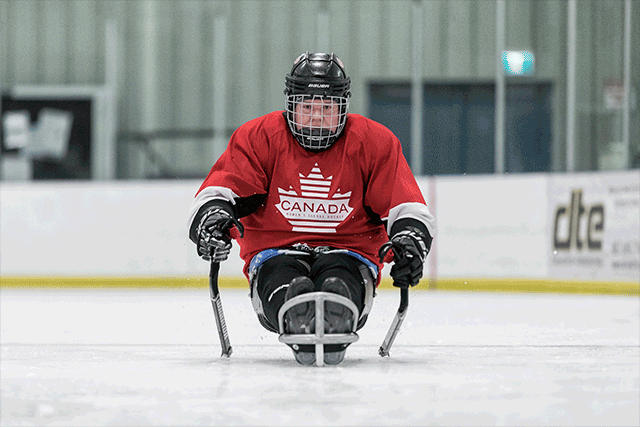 It’s no coincidence that wherever Assinck has gone in her life, women’s
para hockey has grown with her guidance and support. Inspired by wanting to
learn more about spina bifida, she attended Brock University to pursue a
neuroscience degree. As she completed her undergraduate degree, she played
with the Niagara Thunderbirds and volunteered with the Brock Niagara
Penguins, a sporting program for youth and young adults with a physical
disability.
It’s no coincidence that wherever Assinck has gone in her life, women’s
para hockey has grown with her guidance and support. Inspired by wanting to
learn more about spina bifida, she attended Brock University to pursue a
neuroscience degree. As she completed her undergraduate degree, she played
with the Niagara Thunderbirds and volunteered with the Brock Niagara
Penguins, a sporting program for youth and young adults with a physical
disability.
Upon her graduation in 2008, Assinck began her master’s degree and completed her PhD in neuroscience at the University of British Columbia. Looking to continue training as an elite para hockey athlete, she searched for a club team to join in her new home province.
“After growing up in southern Ontario, where para ice hockey was everywhere, I was quite surprised at how little para ice hockey was in British Columbia as a whole,” she says.
Once she joined a team based out of Surrey run by SportAbility, Assinck helped to create new para hockey programs in Vancouver and Victoria, and aided in making opportunities across the province to try the sport. From there, she helped to organize a provincial team with support from BC Hockey.
Traveling across the pond
A postdoctoral fellowship took Assinck overseas in 2017 to the University of Edinburgh and the University of Cambridge. There were a handful of club programs in Great Britain when she moved, and the Canadian quickly joined the closest team to her—the Manchester Mayhem—to continue training.
“I’ve been participating as an athlete on that club team for a while, but I think it became pretty clear that I had a lot of expertise in para hockey, and I got asked about a year into playing here to join as the assistant coach on [Great Britain’s] men’s para ice hockey team,” she says.
Assinck traveled with Team Great Britain to the IPC World Para Hockey Championship, B Pool, in 2019 in Germany.
“I think I was probably the only athlete who was also a coach, I was probably the only female who was also a coach,” she says. “It was a really amazing opportunity to just be on the bench and to help to support the men’s program in what they were doing and in their goals.”
With the addition of coaching on her résumé, a new opportunity presented itself in 2021: the International Paralympic Committee approached the coaches of Great Britain’s men’s para hockey team to ask if they would create a women’s team.
I suddenly found myself with the opportunity to create a team in another country… and it just seemed like the right space for me,” Assinck says.
Assinck quickly got to work. She put out a call for athletes with lower-body disabilities living in Great Britain, interviewed potential players and selected 27 athletes —most of whom had never played para hockey before—for the new program.
Although Assinck was leading the charge overseas, she continued to receive support from Team Canada staff back home. One of the difficulties she encountered was a lack of ice time, meaning she was often teaching a group of athletes how to play hockey without being on the ice.
“She’s spending time in classrooms teaching them the basics of hockey,” says Tara Chisholm, head coach of Canada’s national women’s para hockey team. “She’s renting out gymnasiums so they can do floor hockey and learn about systems that way. She’s literally pulling everything she can together to teach these athletes how to be hockey players in a space that really is not intended to flourish for hockey players.”
Despite the limited resources and the challenges of creating a new team during the COVID-19 pandemic, the newly formed Great Britain national women’s team is prepped to compete at its first international event, the IPC Women’s World Challenge, this fall.
“I honestly do not know how she does everything that she does,” Chisholm says. “I’m very grateful for all the work that she has done that goes unnoticed and that has essentially helped to develop women’s para hockey to where it is right now.”
Growing the game in Canada and beyond
As she created the team, Assinck put together a document of how she kickstarted the program with the goal to share it with other countries so they can replicate the processes.
“That is the big goal right now, to not only grow the game within our borders of Canada, but then to make sure that other girls and women with disabilities across the world have the opportunity to play the sport of hockey,” Chisholm says.
“In order to be in the Paralympics, we need more countries to create teams,” Assinck adds. “We just want to make sure that they have a great first experience and that we’re creating a sustainable program that can continue for many, many years.”
I’m a true believer that if I hadn’t been involved in [para hockey] when I was young, when I was going through the struggles that I had, I wouldn’t be the person I am today,” Assinck says.
Although it’s a bit of an odd position to play against the team you created in competition, Assinck had the full support of her British colleagues to return to Canada and prepare for the Women’s World Challenge. Despite everything she has done to grow the sport, she still prioritizes being the best athlete she can be and she trains hard to earn the privilege of wearing the Maple Leaf on her chest.
She hopes people see her as someone who has dedicated a lot of her life and finances to being an elite athlete, and someone who has gone over and above to support women and para hockey in Canada and around the world. It’s the least she could do for a sport that has changed her life.
“I’m a true believer that if I hadn’t been involved in [para hockey] when I was young, when I was going through the struggles that I had, I wouldn’t be the person I am today,” she says. “I wouldn’t have the confidence to be up speaking in front of thousands of people about neuroscience or even the confidence to be able to be jumping around from team to team in some of my coaching roles.
“I’m hoping that I can look back and feel like I did everything I possibly could to make sure that people with disabilities, particularly women with disabilities, are getting exposure to the sport that means so much to me and could mean so much to them.”
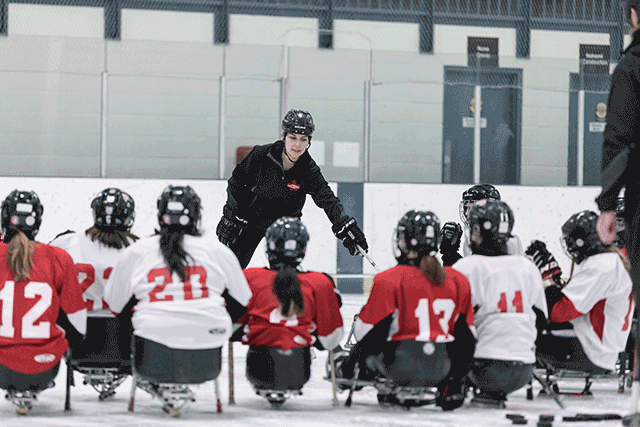
For more information: |
- <
- >
